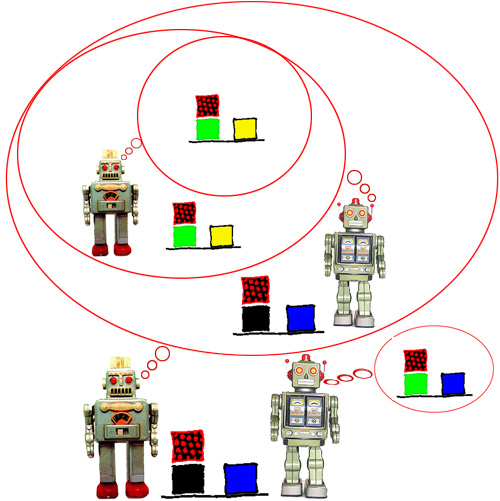Workshop on Planning, Logic and Social Intelligence4 April 2014, Technical University of Denmark, Copenhagen, Denmark |


In his paper "Logic and Conversation", Paul Grice introduced the notion of conversational implicature. The idea has since become important in both philosophy of language and pragmatics, and is both intriguing and difficult because it lives somewhere on the border between social intelligence and linguistics. Indeed, we might say that conversational implicature is what emerges when socially-aware and linguistically-competent agents interact.
In this talk, I will suggest that it is profitable to think of conversational implicature as a form of contextual negotiation of meaning. Topics I would like to at least touch on include: what conversational implicature is, how it differs from the superficially similar notion of presupposition, why implicature should be seen as a negotiative process, why it should be viewed in terms of the actions available to agents, and why epistemic logic and planning are relevant.
The work discussed here is part of ongoing work with Luciana Benottti, Logic,Interaction and Intelligent Systems Group, University of Cordoba, Argentina.
Dynamic Epistemic Logic is claimed to be a dynamic version of epistemic logic. While this being true, there are several dynamical aspects that cannot be reasoned about in Dynamic Epistemic Logic. When a scenario is fixed and a possible world model representing the scenario is constructed, the possible future ways the system can evolve are in some sense already determined. For instance, no new agents can enter the scenario and no new propositional facts can become relevant. This modeling perspective is the main motivation for the partial version of Dynamic Epistemic Logic, which allows for the set of agents and the set of propositional variables to change, that I will introduce in this talk.
We study how unsolvable planning tasks can be modified in order to get solvable. We apply Katsuno and Mendelzon’s distinction between update and revision and show that (1) the modification of the initial state is an update, (2) the modification of the goal description is a revision, and (3) modifications of the set of planning operators can be reduced to initial state modification. The input of all three belief change operations being counterfactual statements (instead of boolean formulas), existing belief change operations cannot be applied as they stand. We show that both the counterfactual statement and the two belief change operations can be captured in Dynamic Logic of Propositional Assignments DL-PA, where we use a variant of Forbus’s update and Dalal’s revision operation to model belief change.
A robot coexisting with humans must not only be able to perform physical tasks, but must also be able to interact with humans in a socially appropriate manner. In many settings, this involves the use of social signals like gaze, facial expression, and language. In this talk, I describe an application of knowledge-level planning to the problem of task-based social interaction, using a robot that must interact with multiple human agents in a simple bartending domain. States are inferred from low-level sensors, using vision and speech as input modalities. High-level actions are selected by the PKS planner, which constructs plans with task, dialogue, and social actions, and provides an alternative to current mainstream methods of interaction management. In particular, PKS treats the action selection problem as an instance of planning with incomplete information and sensing, and builds plans by reasoning about how the robot's knowledge changes due to action. Examples are provided from a series of drink ordering scenarios which have been tested on a real robot with human users.
What can you do? Which states of affair an agent, or a group of agents, have the ability to make come about, or have the power to come about or can force to come about, is formalised in, e.g., coalition logics, alternating-time temporal logics and seeing-to-it-that logics. But what can you do if you have limited knowledge? What do you know that you can do? What do you know how you can do? In the talk I will discuss some issues that appear when we combine ability modalities with epistemic or doxastic modalities, expressing knowledge and belief.